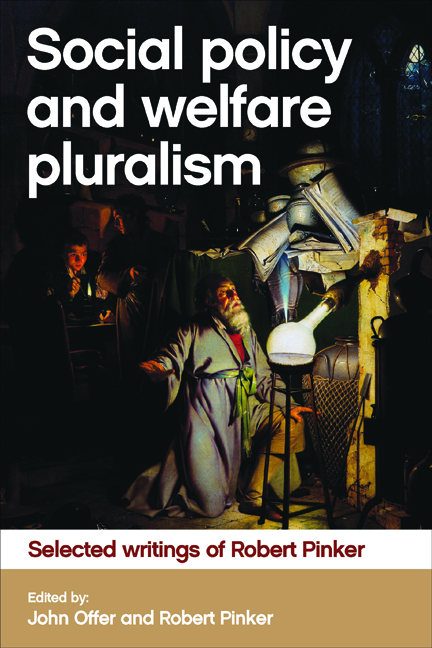Book contents
- Frontmatter
- Contents
- Acknowledgement
- Preface
- General introduction: Robert Pinker on rethinking approaches to welfare
- Introduction to Part One On social policy studies
- one The ends and means of social policy: a personal and generational perspective
- two Social theory and social policy: a challenging relationship
- three Stigma and social welfare
- four The welfare state: a comparative perspective
- five Richard Titmuss and the making of British social policy studies after the Second World War: a reappraisal
- Introduction to Part Two On social care, communities and the conditions for well-being
- six Report of the Working Party on the Role and Tasks of Social Workers: an alternative view
- seven The quest for community: from the Settlement Movement to the Griffiths Report: an historical perspective
- eight Citizenship, civil war and welfare: the making of modern Ireland
- Introduction to Part Three On welfare pluralism
- nine Golden Ages and welfare alchemists
- ten From gift relationships to quasi-markets: an odyssey along the policy paths of altruism and egoism
- eleven The experience of citizenship: a generational perspective
- twelve The right to welfare
- thirteen The prospects for social policy in the UK after the 2015 General Election
- Afterword On the post-Brexit prospects for social policy in the UK
- References
- Index
Introduction to Part Two - On social care, communities and the conditions for well-being
Published online by Cambridge University Press: 08 April 2022
- Frontmatter
- Contents
- Acknowledgement
- Preface
- General introduction: Robert Pinker on rethinking approaches to welfare
- Introduction to Part One On social policy studies
- one The ends and means of social policy: a personal and generational perspective
- two Social theory and social policy: a challenging relationship
- three Stigma and social welfare
- four The welfare state: a comparative perspective
- five Richard Titmuss and the making of British social policy studies after the Second World War: a reappraisal
- Introduction to Part Two On social care, communities and the conditions for well-being
- six Report of the Working Party on the Role and Tasks of Social Workers: an alternative view
- seven The quest for community: from the Settlement Movement to the Griffiths Report: an historical perspective
- eight Citizenship, civil war and welfare: the making of modern Ireland
- Introduction to Part Three On welfare pluralism
- nine Golden Ages and welfare alchemists
- ten From gift relationships to quasi-markets: an odyssey along the policy paths of altruism and egoism
- eleven The experience of citizenship: a generational perspective
- twelve The right to welfare
- thirteen The prospects for social policy in the UK after the 2015 General Election
- Afterword On the post-Brexit prospects for social policy in the UK
- References
- Index
Summary
Social policies concerned with the areas of social care and of social work as a profession have always been topics on which Pinker has made significant contributions. His writings more frequently and in more detail dealt with what are often referred to as the ‘personal social services’ than those of, say, T.H. Marshall, Richard Titmuss or David Donnison. In this book, we are covering, among other matters, Pinker's contributions to the interpretation of social policies affecting social work. However, his extensive contributions on what may be called the politics of social work as a profession or its governance will not be central to this study.
The Conservative Party won the general election in 1979 under Margaret Thatcher. At that time, some communitarians, notably Roger Hadley and Stephen Hatch in Social Welfare and the Failure of the State (1981), wanted to enhance personal social services budgets in order to increase support for informal networks. Other social researchers simply called for more prominence to be given to the study of informal care, and to what extent ‘networks’ of care could be said to exist. Within this general context, the Conservative government set up a working party in 1980 to review the role and tasks of social workers.
As explained in the General introduction, Pinker was directly involved, being made a member of this working party (as was Hadley, with whom he disagreed on some key matters). Chaired by Peter Barclay, it completed its report, Social Workers: Their Role and Tasks, in 1982. Pinker's own contribution to that report was in fact a note of dissent, ‘An alternative view’. It became Appendix B (pp 236–62) of the report, and it summarised the reasons why Pinker dissented from the main recommendations. Pinker's dissent is frequently cited in discussions relating to the historical and current practices of social care and social work, and now arguably more so than the main report itself. Since ‘An alternative view’ is no longer at all easy to obtain (nor indeed is the main report), we have made a point of including the full text of ‘An alternative view’ in this part as Chapter Six.
- Type
- Chapter
- Information
- Social Policy and Welfare PluralismSelected Writings of Robert Pinker, pp. 113 - 122Publisher: Bristol University PressPrint publication year: 2017



